“A person never truly dies until their spirit is completely forgotten and the last person who they’ve touched has perished. So long as we continue to keep the spirit alive, it continues to serve the world.” – Jarard Paige, J. Elliot Marketing
Serving the World by Paying It Forward
In 2012, J. Elliot Marketing in partnership with Women in Aviation International (WAI) announced the $2,500 Christine Reed Memorial Flight Scholarship. Christine passed away before she was able to reach her dream of becoming a private pilot. So to keep her spirit alive, J. Elliot Marketing offers an annual scholarship to women ages 16-30 who have already soloed and are working towards their pilot certificate/ratings.
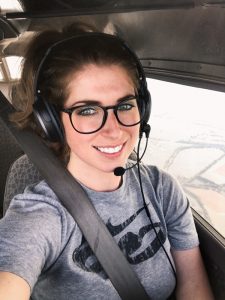 Meet Tara Ryan – 2018 & 2020 Scholarship Recipient
Meet Tara Ryan – 2018 & 2020 Scholarship Recipient
In January 2018, Ms. Tara Ryan was awarded the Christine Reed Memorial Flight Scholarship, as she embarked on her aviation journey. In just two short years, she has transitioned from being a Funeral Director to now a full-time flight instructor and determined aviation mentor. Given that no scholarships were awarded in 2019, we had the opportunity to offer two scholarships in 2020 and Tara took the chance of applying again. Take a moment to learn why we are proud to support her along her continued, inspiring journey in aviation.
Two years ago when you were first awarded this scholarship, you were spending your days as a Funeral Director and now you’re a full-time flight instructor. How has that transition been in your life?
I didn’t give myself a transition time from leaving Funeral Directing to flying full-time. I scheduled my Private Pilot Checkride and then quit my job to prepare for that. The day after my Checkride, I moved to Florida and started flight training full-time. I had an all or nothing mentality because right now is the time to be in aviation. The opportunities are endless.
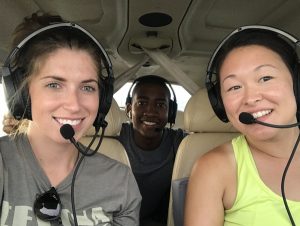 Now that my schedule has slowed down some compared to that during my training, I find myself missing the funeral home at times. I thought that career was going to be my lifelong job. I loved the work and the satisfaction from helping people in their time of need. But it was just that – a job. I don’t feel like I’m working a “job” as a flight instructor. I get to go fly everyday. Literally, I get to go fly everyday. Which is awesome!
Now that my schedule has slowed down some compared to that during my training, I find myself missing the funeral home at times. I thought that career was going to be my lifelong job. I loved the work and the satisfaction from helping people in their time of need. But it was just that – a job. I don’t feel like I’m working a “job” as a flight instructor. I get to go fly everyday. Literally, I get to go fly everyday. Which is awesome!
On top of that, I get to go hang out with people who share the same passion about aviation that I do. I am so happy to have taken the plunge and switched to aviation. If anything, I am grateful to have had the chance to experience and develop two awesome skill sets, and know that I still have one I can fall back on or use as a retirement plan.
You’re currently training both private and commercial pilots, as well as high school age or younger students with an interest in aviation. What are the some of the key differences between preparing these two different groups of interested aviators?
I try to do my best to treat all my students like they are adults. They tend to respond better to this since no one likes to feel inferior. My objective is to create an equal learning environment for everyone.
Teenagers and adults alike, can learn from each other. The main differences are that high school age or younger students lean more towards wanting assignments. They prefer to be graded with instant results to understand how they are doing. While adults, on the other hand, are more self-study oriented and will ask questions when they need it.
The most interesting thing I’ve witnessed with the younger age group occurs when I have a student who has never even driven a car but is now flying an aircraft. Once they hit the age to be able to get their driver’s permit, it seems like a night and day difference. It’s almost as if the reality of the responsibility they now have taken on, really starts to shine through. They realize very quickly that one has to be as safe as possible as a pilot. You must not only protect the people you’re sharing the air with, but also those who are on the ground below you. Once they realize the “sharing the road” concept in a vehicle, the mental light bulb of safety strikes them in the aircraft.
I typically see a quick increase in maturity levels when this mental shift happens, and they start to study more independently and take flying more seriously. It is such a satisfying feeling watching these young men and women start growing into young adults. They have so much potential and opportunity, by starting at such a young age, to really make an impact on the future generations of aviators to come.
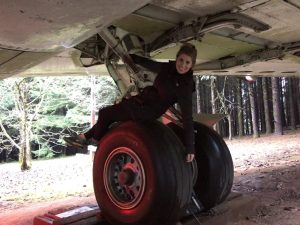 You’re also currently enrolled in a Master’s of Business Leadership program through the University of Queensland Australia. How does this degree figure into your long-term professional goals?
You’re also currently enrolled in a Master’s of Business Leadership program through the University of Queensland Australia. How does this degree figure into your long-term professional goals?
Being in aviation you commit yourself to being a lifelong learner. I personally don’t believe that applies just to aviation. Education is a staple for furthering your future and having a backup plan.
A Master’s of Business Leadership coupled with my Bachelor’s in Communications, I feel are a solid foundation for a side project when I make it to an airline. Speaking with pilot’s who have already went down this path, a lot of them have stressed that you should have some kind of side business going on. You never know what could happen in the airline industry and you should be prepared for anything.
Over the last two years, have you been able to expand your involvement in WAI and other aviation groups?
Currently, I belong to the 99’s, WAI Bluegrass Chapter and Central Florida Chapter, EAA and the Balloon Society of Kentucky. I am the Hospitality Chair for the WAI Bluegrass chapter, an idea that was borrowed from the Florida chapter. So, thank you for that CF WAI Chapter. (This chair sends out Birthday cards, celebratory congratulations for anything that someone has accomplished lately whether it be at their jobs, passing a Checkride, a FAA written, engagement, etc.).
I actively participate in Young Eagle flights for the EAA, which are so fun! I’m a new member to the Balloon Society since I started my Lighter Than Air rating this past summer. I am amazed at the closeness of the ballooning community. It is unlike anything I’ve seen in fixed-wing aviation, so far. They are all practically family. Most of the older members watched the younger members have kids and grown up. Now those kids are all ballooning too. All of the organizations are pretty remarkable and have all the types of members you can look to for guidance or just to be your friend.
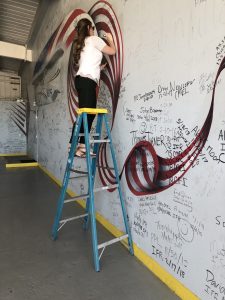 You mentioned in your scholarship essay that you’d like to progress to becoming a CFII, a path often skipped by those desiring to becoming a professional pilot. Tell us why taking this step is so important to you.
You mentioned in your scholarship essay that you’d like to progress to becoming a CFII, a path often skipped by those desiring to becoming a professional pilot. Tell us why taking this step is so important to you.
I knew becoming a CFI would make me a better pilot. Instructing every day is expanding my own skill set. I would like to get CFII to help improve and expand on my own knowledge and instrument flying skills. This will result in me being a better pilot and also a better instructor.
Instrument flying is such an important skill to expand on since IFR flying can really be dangerous if you don’t know what you’re doing. This step is also important to me because I can see the need for CFII’s. There just aren’t that many at my local airfield. I want to be there to give the opportunity to my students and others that want to continue their aviation journey. To help expand them their skills and make them better pilots.
In just two years, you’ve gone from student pilot to aviation mentor, and your passion and progress are truly commendable. What drives you to continue to be a beacon for the next generation of aspiring aviators?
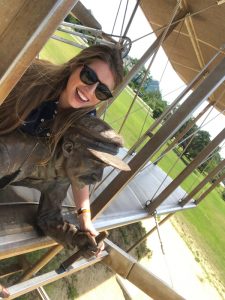 One of the main things that drives me is my desire to improve on how the primary training is taught. Since it wasn’t long ago that I was training for my own Private Pilot and Commercial certificates, I’m able to look back and focus on continuing the care and thought my own instructors put into training me.
One of the main things that drives me is my desire to improve on how the primary training is taught. Since it wasn’t long ago that I was training for my own Private Pilot and Commercial certificates, I’m able to look back and focus on continuing the care and thought my own instructors put into training me.
I feel like I am more relatable being fresh from training into instructing, since I can remember some of the things that were initially confusing or more of a challenge for me. This allows me to set the bar for teaching my students in multiple ways if something is more difficult for them.
My passion goes beyond being a flight instructor. Since I am primarily with high school age and younger students, it gives me an opportunity to help mentor them through their own personal struggles, questions that they might have, and give them an outlet through aviation to deal with these things. My hopes for the next generation of aviators is that they commit to safety, lifelong learning, and develop a healthy relationship amongst other aviators.
This is a small community and we should all be there to support each other. I aspire to create my own scholarship and to be able to pay it forward since I have been so fortunate to be a recipient of the Christine Reed Memorial Flight Scholarship twice now. I will always be so grateful for both of these opportunities that have helped propel me forward on my aviation journey.
J. Elliot Marketing is proud to have Tara as both the sixth and eighth recipient of the Christine Reed Memorial Flight Scholarship and looks forward to offering this scholarship annually. By helping others reach their dreams, J. Elliot Marketing keeps Christine’s spirit alive. Perhaps this minor step serves to inspire others to think of ways they can share their passions with the world and find ways to pay it forward.

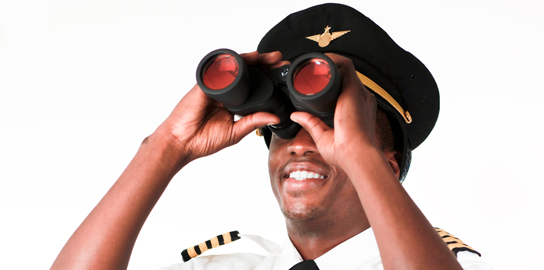

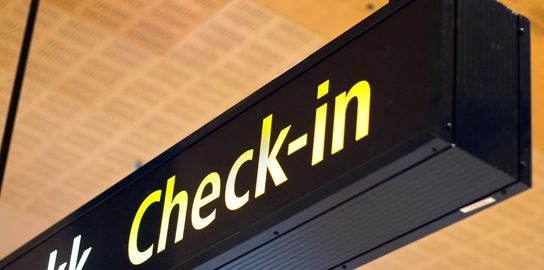
 J. Elliot Marketing has had the pleasure of helping numerous clients plot the best course to achieve their goals. These clients have included:
J. Elliot Marketing has had the pleasure of helping numerous clients plot the best course to achieve their goals. These clients have included: